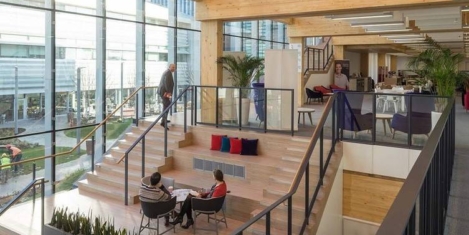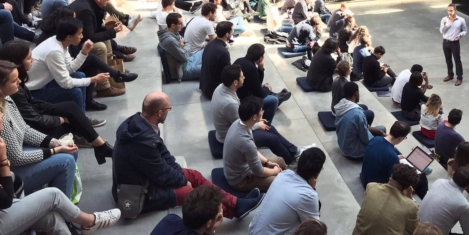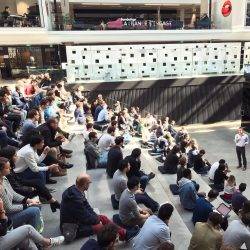October 10, 2018
CIB sets out a roadmap for the creation of intelligent and responsive buildings
 The International Council for Research and Innovation in Building and Construction (CIB) has published a free roadmap written by members of the W098 Commission and CIBSE Intelligent Buildings Group, which presents collective ideas for the creation of intelligent and responsive buildings for current needs and the future. Intelligent buildings present a number of challenges, according to the authors. They must be responsive to people’s needs including their health and wellbeing; be sustainable in the use of resources as well as incorporating the most useful parts of the evolving technologies.
The International Council for Research and Innovation in Building and Construction (CIB) has published a free roadmap written by members of the W098 Commission and CIBSE Intelligent Buildings Group, which presents collective ideas for the creation of intelligent and responsive buildings for current needs and the future. Intelligent buildings present a number of challenges, according to the authors. They must be responsive to people’s needs including their health and wellbeing; be sustainable in the use of resources as well as incorporating the most useful parts of the evolving technologies.











 Today is World Mental Health Day and new research from Bupa has found that concerns over mental health is not confined to adults, as a third of employees say they worry about their children’s mental health while at work. The research, conducted among working parents of 4-18 year olds reveals that children’s mental health is among parents’ greatest concerns, on par with physical health and academic performance. The only concern that ranks higher is future financial prospects.
Today is World Mental Health Day and new research from Bupa has found that concerns over mental health is not confined to adults, as a third of employees say they worry about their children’s mental health while at work. The research, conducted among working parents of 4-18 year olds reveals that children’s mental health is among parents’ greatest concerns, on par with physical health and academic performance. The only concern that ranks higher is future financial prospects. 
 The majority of employees (77 percent) agree that people should take proactive steps to manage their mental health a new survey has revealed. Of those surveyed, the vast majority felt that there is increased awareness about mental health (87 percent) and that people are more willing to talk openly about mental health issues than they were a few years ago (82 percent). The impact of high-profile people speaking out about their own mental health challenges was believed to be the biggest influencing factor, cited by more than half (53 percent) of respondents.
The majority of employees (77 percent) agree that people should take proactive steps to manage their mental health a new survey has revealed. Of those surveyed, the vast majority felt that there is increased awareness about mental health (87 percent) and that people are more willing to talk openly about mental health issues than they were a few years ago (82 percent). The impact of high-profile people speaking out about their own mental health challenges was believed to be the biggest influencing factor, cited by more than half (53 percent) of respondents. 
 More than half of CEOs (53 percent) admit they can’t find candidates with the necessary skills to help them navigate an increasingly digitalised business landscape a new survey from Robert Half has claimed. These include data analysis and digital skills, as well as softer skills such as resilience, adaptability to change and critical thinking. This means that nearly five million UK SMEs, the equivalent to four out of every five (82 percent) small and medium-sized companies, are struggling to attract the skills they need. As a result, many are being forced to offer salary packages higher than originally expected to recruit the right talent.
More than half of CEOs (53 percent) admit they can’t find candidates with the necessary skills to help them navigate an increasingly digitalised business landscape a new survey from Robert Half has claimed. These include data analysis and digital skills, as well as softer skills such as resilience, adaptability to change and critical thinking. This means that nearly five million UK SMEs, the equivalent to four out of every five (82 percent) small and medium-sized companies, are struggling to attract the skills they need. As a result, many are being forced to offer salary packages higher than originally expected to recruit the right talent. 


 A new report published by Information Services Group (
A new report published by Information Services Group (















